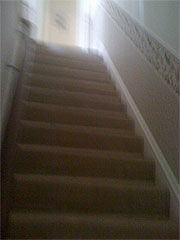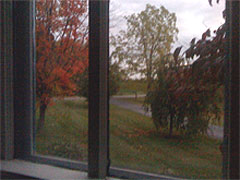The Ledger
“Come with me,” she said, a command that once upon a time would elicit a groan. She led me into the room that is part-laundry room, part-office. I watched her open the bottom drawer of her filing cabinet. She pulled out two ledgers.
“This one has all my medical expenses.” She opened the pages to show me the rows of entries, evenly notated in handwriting I recognized from grocery lists and birthday cards and notes she wrote to school excusing my absence. That’s something you never forget: the protective lines and loops of your mother’s handwriting.
She pointed to the pages in the front. “These are things I paid for, every day things like prescriptions and lab tests.” She flipped to the pages at the back of the notebook. “These are the big medical costs – covered by insurance.” Her familiar index finger tracked down the first column, running over all the words. Oncologist. Chemotherapy. Blood transfusion. Everything detailed. Everything organized.
She opened up the second ledger. Like the first, its columns were neatly labeled and ordered; each page separated by a pile of loose receipts retained for her records. “This book has all my expenses for the year, for my taxes.”
That’s my mother, always organized, preparing to die the same pragmatic and efficient way she’s always lived.
She desperately needed help going through the upstairs backroom, she said, so we obliged, her three grown children following her up the stairs with an eagerness un-witnessed during our childhood. Backroom, in our family, is a euphemism for junk room. The downstairs backroom is a history project, filled with our parents’ past; their love letters, college papers, every issue of Good Housekeeping magazine, neatly boxed, saved since 1958 or thereabouts.  The upstairs backroom, once my brother’s room (with football-patterned wall paper) and then mine (painted white but with bright yellow and neon green shag carpet), now a third guest bedroom rarely used not only because it is the less grand of all the bedrooms, but because the bed was completely covered with bags and baubles brought home from meetings and conventions, or those awkward gifts received from well-meaning friends with taste so strikingly different that their generosity, though appreciated, is never fully utilized. At the foot of the bed, a row of boxes of belongings earmarked for a future yard sale. All the framed awards she received during her admirable career – too numerous to fit on the walls – piled on the shelves and on the floor, stacked against the wall. In the dresser drawers, things too precious to part with, ivory kid gloves from a governor’s ball, a silk purse her mother bought in Hong Kong, old black and white photographs, our baby teeth hidden in tiny envelopes, dated in my father’s handwriting.
The upstairs backroom, once my brother’s room (with football-patterned wall paper) and then mine (painted white but with bright yellow and neon green shag carpet), now a third guest bedroom rarely used not only because it is the less grand of all the bedrooms, but because the bed was completely covered with bags and baubles brought home from meetings and conventions, or those awkward gifts received from well-meaning friends with taste so strikingly different that their generosity, though appreciated, is never fully utilized. At the foot of the bed, a row of boxes of belongings earmarked for a future yard sale. All the framed awards she received during her admirable career – too numerous to fit on the walls – piled on the shelves and on the floor, stacked against the wall. In the dresser drawers, things too precious to part with, ivory kid gloves from a governor’s ball, a silk purse her mother bought in Hong Kong, old black and white photographs, our baby teeth hidden in tiny envelopes, dated in my father’s handwriting.
It’s always the hardest room to clean, the one packed with things of only sentimental value.
The doctors never thought she’d live this long. Last winter, when the diagnosis of pre-leukemic myelodysplasia first pounded its gavel, they ordered a palliative treatment, a mild chemo easily administered five consecutive days in a monthly cycle, a treatment as inconvenient as having your period. In addition, frequent blood transfusions to introduce new cells to replace her tired, incompetent ones. Lots of doctor’s visits and the requisite poking and probing, but all of it relatively close to home and all of her loyal friends have rallied to help, taking turns driving her to all her appointments, checking in on her between medical visits. Though she is still more than capable to drive herself, good company is never a bad idea.
She has a quality of life that is absolutely acceptable. Of course she has slowed her crazy itinerary of activities and travel. But she still does a lot: a dizzying dance-card of lunches and dinner dates with friends, an occasional board meeting, her own shopping and errands. She lives more wisely now, doing only what she wants and using her lack of white blood cells as a good excuse to cut out anything extraneous. After each monthly transfusion, she gets a boost of energy and feels good. But her marrow won’t manufacture the good blood cells she needs, so she’s vulnerable to infection. She avoids crowds and coughing strangers. She won’t die of leukemia; she’ll die because of what the leukemia won’t let her fight.
There is, in fact, a growth in her lung. Is it a tumor? An infection? A fungal growth? The doctors aren’t sure. But the risk of an invasive procedure to determine its nature is deemed too dangerous. Even if they knew what it was, they wouldn’t treat it. A surgery brings too much risk for infection. A stronger chemotherapy also exists, but the doctor opts not to administer it because it requires a portacath, which can too easily become infected. The thought of such medical paraphernalia gives me flashbacks to when Short-pants was in the hospital and her stay was lengthened because the permanent drip became infected, leading to a sepsis that set her recovery back at least a month – and who knows how close she came to not recovering as a result of that secondary infection, an infection my mother would not be able to overcome.

But she looks so beautiful, my mother. I couldn’t take my eyes off her. She smiles. She laughs. She doesn’t look or act sick. She is living in a state of grace, I think.
Her doctor’s priority is not to cure her – since that is impossible – but to slow the disease so that she might have a quality of life while preparing for its end. For over a month now she’s been off the chemo treatment, and she’s no worse when she was on it. The doctors are baffled to see her doing so well. My mother’s constitution, in the end, is remarkable.
I asked her if she was scared. “No,” she said, “Dying is a part of life. Nobody can live forever.” This is indisputable; it can happen to any of us, any day – a fluke car crash or the diagnosis we dread – just like that. But once the sentence is offered, the disease is certain and incurable, I can only imagine what it’s like to stand on the threshold of the uncertain mystery ahead.
She shakes her head, not with resignation but with gratitude, and lists her fond memories: a happy childhood in Havana, enjoying college, all the good years with my father before he died. My siblings and I have managed not to disappoint her. She had a serious career when many women couldn’t, and even in retirement, continues to make an impact in her field. She’s traveled all over the globe. She adores her grandchildren, and this is reciprocated.
There’s no place on her ledger for remorse. She’s just counting up all the good things, year-by-year. Except that now she notices them day-to-day. You can’t imagine how much I am in awe of her, my mother, still modeling for me how to live – right up to the end.


October 21st, 2009 at 8:54 am
A quick P.S.: I shared this text with my mother, before I posted it, to ask her if it was okay to publish it on my blog. You know her answer.
October 21st, 2009 at 12:54 pm
Your note today brought tears to my eyes. My mom – well, there are no words, but let me try. She recently had two or three strokes, from which she has recovered admirably. Now, an unexpected thud from the basement sends me into a anxious sprint down the stairs, thinking I’ll find her in a heap again. Hearing a thud from outside means she’s fallen off the roof while picking pears (No kidding.)
I had a moment of panic a few weeks ago when I realized I am afraid of living in a world without my mom. As silly as it sounds, I (almost 50) am not ready to be an orphan. This is ridiculous. I’m a grown woman, a business owner, a parent, friend, blah, blah, blah… and still, I’m not ready to be an orphan. It will likely happen, though. I’m not sure I’ll handle it with as much grace and spirit as my mother shows every day.
October 21st, 2009 at 11:21 pm
This was a beautiful peek at a beautiful human. You have such a great writing gift and I look forward to each and every entry. Keep on writing and much love to your family.
October 24th, 2009 at 10:23 pm
The thing I never knew the answer to was whether my mother knew she was dying. In some ways, she denied it – even when she was no longer able to go upstairs, and living in a hospital bed, her world constrained to trips from the living room to the kitchen, first by walker, later by wheelchair – even then she’d say, “I don’t know how much longer I’ll be in this hospital bed”.
Your mother’s clarity is admirable. Much luck to her.
February 8th, 2011 at 2:07 pm
This is an indescribably beautiful post. Your writing brings me comfort in dark hours. Thank you.
M2Mx
October 15th, 2014 at 11:37 pm
Wow! What a gorgeous post. There’s love in every word. Every. Word.
Thank you.